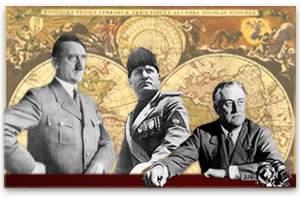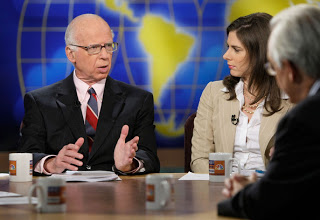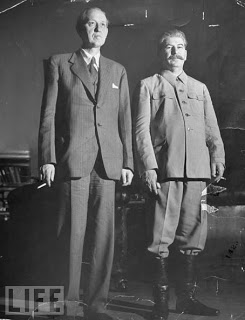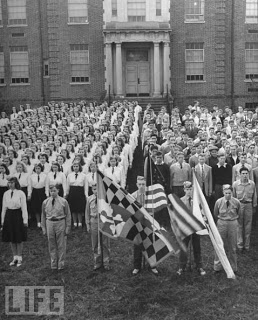Tuesday, November 2, 2010
Slaughter as “Stimulus”
 |
| Their Fascists, and Ours: Fuhrer, Il Duce, and FDR. |
Militarism is the one great glamor public-works project upon which a variety of elements in the community can be brought into agreement. —
John T. Flynn, As We Go Marching (1944)
The Keynesian welfare state is best described as the mild-mannered alter ego of the totalitarian welfare state. The official alchemists responsible for transmuting debt into political power eventually find it impossible to siphon wealth out of the productive class in amounts sufficient to meet the needs of the political class. When this happens, the ruling elite will inevitably turn to bloodshed as a source of economic “stimulus.”
David Broder of the Washington Post scandalized the punditocracy by openly reciting this formula in a recent column as a prescription for both the ailing economy and Barack Obama’s increasingly enfeebled presidency.
 |
| The Panel wonders: “Who is this elderly dimwit, and why should we listen to him?” |

As has been noted elsewhere, the Pentagon itself institutionalizes the dual nature of the Welfare/Warfare State: Maintaining a globe-straddling military means operating one of the world’s largest welfare distribution bureaucracies. Harry Hopkins, a key architect of the New Deal and intimate adviser to FDR (and likely Soviet agent) managed to embody that same duality all by himself.
 |
| Hopkins and Stalin. |
To adherents of the New Deal cult, Hopkins was Aaron to FDR’s Moses: When Hopkins spoke, his voice was giving form to the will of the Dear Leader himself. Following a career as a social worker, Hopkins was appointed as FDR’s vicar in charge of warfare. In January 1941 he was dispatched to assure Churchill that FDR would contrive to get the United States involved in the European war.
After FDR successfully opened the back door to war by manipulating Japan into firing the first shot (as Henry Stimson so memorably put it), Hopkins was placed in charge of the Lend-Lease abomination. In that capacity he did more than his share to see that many of the urban poor whose plight had moved him to such distress would be relieved of their burdens by dying in distant battlefields on behalf of London’s declining empire and to the greater glory of Stalin’s expanding one.
Like the unspeakably evil Bernard Baruch, who presided over Woodrow Wilson’s version of war socialism, Hopkins was enchanted by the prospect of collectivizing the entire economy in the name of war planning. Hopkins memorably gave voice to his ambitions in “You Will Be Mobilized,” an essay published in the December 1942 edition of American Magazine (and excerpted a few months later in Reader’s Digest).
 |
| American students muster in the service of the state… |
Historian Thomas Fleming, in his important book The New Dealers’ War, describes Hopkins’ essay as “a draconian sermon” on the supposed virtues of a totalitarian planned economy, in which the author eagerly anticipated “an American Sparta laboring under the grim-visaged bureaucrats of the OPA and other war agencies.”
“No one knows how the mobilization of workers will actually operate,” admitted the commissar, “but probably at first able-bodied persons in non-essential work will be given a wide range of choice as to what they will do and where they will work.” Of course, the only real option would be for workers to “choose” to do as instructed by their superiors: “If they don’t move voluntarily, their manpower organization will direct them to specific jobs.”
Hopkins cheerfully predicted that earnings and expenditures — in fact, every facet of life — would likewise be regimented by the war planning elite:
 |
| …while their German counterparts do likewise. |
“Through forced savings and taxes, our spending will be limited and priorities far more widespread than at present will determine the kinds of food, clothing, housing and businesses which we will have and will affect every detail of our daily lives. We should not be permitted to ride on a train, make a long distance telephone call, or send a telegram without evidence that these are necessary.”
Sacrifices such as these were intended only for the hoi polloi, of course; they were not to be shared by the Warfare State’s nomenklatura. Just a few days after Hopkins’ totalitarian homily saw print, Cissy Peterson of the Washington Times-Herald published a detailed account of a multi-million-dollar dinner dance arranged by Baruch at Washington’s Carlton Hotel to celebrate Hopkins’ marriage to fashion writer Louise Macy.
At a time when productive Americans were being subjected to rationing, ordered to eschew rudimentary creature comforts, and piss away their earnings on government war bonds, Hopkins and other New Deal commissars feasted from a menu offering dozens of expensive, exotic delicacies, most of them garnished with French names that wouldn’t fall gracefully from the lips of working people who were enduring food rationing and being constantly hectored about the necessity of saving scraps as part of the war effort.
“At every place was an expensive gift from the host,” observes Fleming. “Vintage champagne flowed without stint, along with a plethora of other French wines.” Those assembled for the event represented “a who’s who of the top echelon of wartime Washington,” who gathered to enjoy a brief respite from the rigorous work of plundering other people’s wealth and sending their children off to die.
Most of the American public either ignored such official hypocrisy or accepted it with sullen resignation. However, there were a hardy few who joined John T. Flynn in decrying America’s descent into militarist totalitarianism, despite the social inconvenience — and the very real personal danger — they confronted.
“We used to get all worked up over the bombing of civilians but that was before the United Nations took the initiative in bombing cities,” protested Syracuse resident Benjamin Le Roy Candee, Jr. in a letter published in a Quaker anti-war newsletter. “We used to condemn the practice of shutting up innocent people in camps surrounded by barbed wire, but that was before the term `relocation center’ became part of the American vocabulary.”

“Recently there has been much breast beating about the evil of the Nazi model of training youth for war — `education for death,'” continued Mr. Candee. “How awful, we said, to get hold of children before they know better and mold them into believing in the supremacy of the state and into believing that the greatest aim in life is dying for the state. Well, we won’t have to condemn it much longer because the Victory Corps is coming to American high schools.”
The Victory Corps, organized under the aegis of the U.S. Office of Education’s Wartime Commission, was a public-private initiative intended to mobilize “the high-school youth sector in the all-out effort of our total war,” explained an official publication.
Military conscription of “every able-bodied male, 18 to 45 years of age,” would be necessary in order to build a 10,000,000-man army; this would be supported by “a force of 20,000,000 persons in direct war production and transportation,” and an agricultural army (of the sort described in the tenth plank of the Communist Manifesto, perhaps) of 12,000,000 more.
“The most important test of every day’s decisions must be this: What can we do to hit the enemy harder; to contribute to his destruction?” insisted the Victory Corps organizing manual. “If what we are doing is not clearly an immediate or remote contribution to winning this war, then we should not be doing it.” Of course, the “contributions” made by champagne-swilling commissars like Hopkins were less painful than those demanded of conscripts send to bleed on the battlefield, but them’s the breaks, I suppose.
Only by accepting the yoke of the Warfare State could Americans avoid the horrors of life under Fascist rule, which — as described in the Victory Corps manual — honestly doesn’t sound dramatically different:
“Let us not forget what happens to youth when the Nazi slave drivers are in position to crack the whip. Consider that more than 3,000,000 youngsters from the Balkan States have been rounded up for compulsory labor service (slavery) in Germany; that Gestapo agents in Belgium have been kidnapping mere boys for military service. That’s why we mean to win this war for survival” — that is, for the survival of an American-grown variant of the same ruling ideology.
With the current depression growing deeper and nastier, the Obama administration and the banking cartel controlling it have run just about every option in the Keynesian playbook, save one: The “Hail, Ares!” play Broder suggests. All that’s necessary to make this happen is the arrival of a Congress under the influence of the most militaristic element of the GOP. It’s quite likely that those nostalgic for the reign of FDR’s nation-breaking war commissars will soon have reason to break out in a chorus of “Happy Days Are Here Again.”
Content retrieved from: http://freedominourtime.blogspot.com/2010/11/slaughter-as-stimulus.html.



